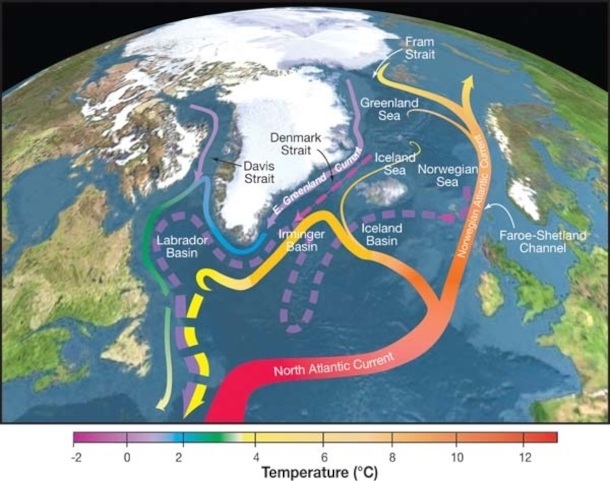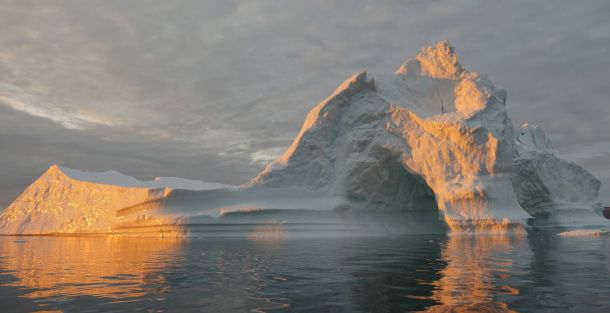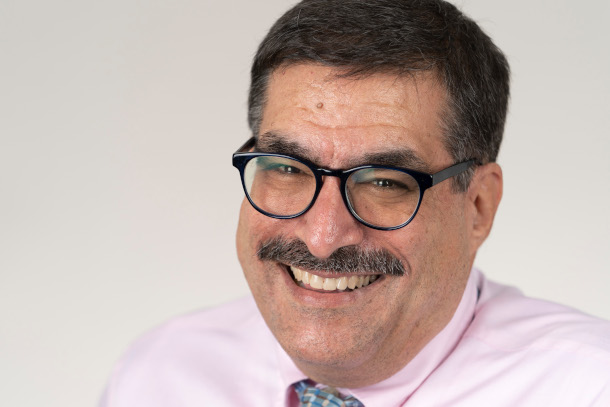Vital Ocean Current Threatens Collapse
Air Date: Week of March 8, 2024

The Atlantic meridional overturning circulation, also known as AMOC, influences weather patterns on land as well as ocean salinity and temperature. (Photo: R. Curry, Woods Hole Oceanographic Institution / Science / USGCRP, Wikimedia Commons, CC BY 3.0)
As the climate crisis intensifies, a vital ocean current that includes the Gulf Stream seems to be falling apart, and thus could fail its mission to moderate the climate by bringing heat north from the tropics and cold back south. AP science and environment reporter Seth Borenstein joins Host Steve Curwood to explain the latest research and the potentially disastrous shutdown of this current.
Transcript
BELTRAN: From PRX and the Jennifer and Ted Stanley Studios at the University of Massachusetts Boston, this is Living on Earth. I'm Paloma Beltran.
CURWOOD: And I’m Steve Curwood.
As the climate crisis intensifies, a vital ocean current that includes the Gulf Stream seems to be falling apart, and thus could fail its mission to moderate the climate by bringing heat north from the tropics and cold back south. For decades, scientists have been studying the Atlantic Meridional Overturning Circulation, also known as the AMOC, in the hopes of figuring out just how soon its collapse might come. And as AP science and environment reporter Seth Borenstein tells us, the latest data do not bode well. Seth, welcome back to Living on Earth!
BORENSTEIN: Thanks for having me, Steve.
CURWOOD: So talk to me about the physics of all of this. How exactly does an ocean current like this work?
BORENSTEIN: Actually, if you think about it, it's something we can all understand. It's saltwater versus freshwater. Saltwater is more dense, freshwater isn't. The saltier it is, the more it moves, and there's the problem: it's getting less salty. Or you could call it more fresh, if you prefer. What's happening is we're seeing a lot of melt in Greenland. And that water that is melting from the ice sheets, it's fresh. And if it's a giant conveyor belt, the engine is just off of Greenland. And it's pouring more freshwater than it used to get there. So it's sort of like watering down your gas tank.
CURWOOD: Hm. That's not a good idea. I mean, your car does not like water in its gasoline.
BORENSTEIN: So this has happened before. I mean, this is, you know, we've seen it slow down before, millennia ago, long time ago. Because we've also seen ice sheets melt before. It's melted naturally, this is not natural. This is from human-caused climate change causing a dramatic melt in Greenland, as well as other places. But Greenland has a giant ice sheet. And you can go there and actually sea melting occurring before your eyes. And that is freshwater going in there.

The AMOC slowdown is a result of melting glaciers, primarily in Greenland, releasing freshwater into the ocean. This disrupts the salinity levels, which in turn affects the rate at which the water circulates. (Photo: Saskia Madlener, NASA, Flickr, CC BY 2.0)
CURWOOD: Now, for years, I think probably decades I should say, people like Wallace Broecker at Columbia University were saying what he called the North Atlantic Conveyor Belt, which we now call the AMOC, the Atlantic Meridional Overturning Circulation. He said this thing, if we keep warming the planet, we're going to imperil the functionality of this. And in fact, he said, even way back when, it's starting to slow down. So scientists have been worried about this for quite a while. What new data do we have now, Seth? What's been presented to us?
BORENSTEIN: Well, first off, scientists have worried for about this for a long while, I've been covering climate change, like you, for more than a quarter century. And strangely enough, that made me much more skeptical. Because in the late 90s, there was a lot of study about the AMOC slowing down. And then the Intergovernmental Panel on Climate Change and others said, whoa, slow down on this slowdown stuff. It's not as bad as it looks. It's centuries away. It's an issue, but it's not an issue for right now. And it's happening slowly. But this was about the time, if you remember the movie The Day After Tomorrow, which is horribly fictional, you know, it is by no means science. But that is sort of the science it is very loosely based on. So you have this. And like others in the late 90s, early 2000s, I was writing about it. And then, you know, I was sort of convinced by mainstream scientists who said, you know, this is not as bad as we feared. And so I personally have actually been skeptical and waiting. But in the last three, four years, we're seeing more data. And that's because starting in 2004, scientists started measuring it regularly, which they didn't do. So before, it was based on a lot of observations that were not as good and a lot of modeling and physics. Now it's based on data—and modeling and physics. And so there have been studies in the last two years. One in 2023. And then one in February, that came out and said, we are seeing slowing down. Not only are we seeing slowing down, this latest study that came out last month, said, okay, here's what we should be looking for. Here's sort of this key measurement. And it's an awfully complicated measurement, and it's based on salinity, and it's based on temperature. And they're saying, when we do computer models and see everything go to hell, essentially, fall off a cliff, they're showing we're getting closer to that. So these studies the last couple of years are saying, hey, it may not be centuries, it may be decades or generations away. No one's saying it's tomorrow. No one is saying it's next year. But it's looking closer. It's still, at least for me, and maybe you and many listeners, not in our lifetime, but it could be in lifetime with some of the younger people. And if it happens, then boy, watch out.

Western Europe experiences a warmer climate than other regions at a similar latitude due to the warm waters transported Northwards by the Gulf Stream. A collapse of the AMOC would plunge temperatures in the region by an estimated 9 to 27 degrees Celsius. Shown here is the aftermath of Storm Emma in Dublin, which brought abnormally high snowfall of nearly 2 feet. An AMOC collapse would make storms like this increasingly common and extreme. (Photo: William Murphy, Flickr, CC BY-SA 2.0)
CURWOOD: Yeah, so what will be the consequences of the AMOC collapse? How would it be felt around the world?
BORENSTEIN: Well, if you think about it, remember, this is distributing energy. Basically, it's taking warmth from the southern hemisphere and the Americas to Europe and the northern hemisphere. If that shuts down, what you would see is the northern hemisphere get colder, and quickly. And you would see the southern hemisphere get warmer, and quickly. The biggest effect, scientists say, of an AMOC collapse, is incredibly colder temperatures in Europe and England and the United Kingdom area. You would see sea level rises beyond climate change, and warming in the southern hemisphere. The effects in North America, certainly not as extreme as they are in Europe. But it is a dramatic change in climate. And strangely enough, if and when it happens, you have what is considered global warming causing icier conditions, frigid conditions in parts of Europe. But that is part of climate change.
CURWOOD: Climate disruption, some call it.
BORENSTEIN: Yes.
CURWOOD: So now let's talk a little bit of the math here. So as I understand it, the AMOC circulation has decreased some since the 1950s. What's the rate of change? Is it just off a certain amount? Or is the decrease increasing?
BORENSTEIN: In other words, are we seeing an acceleration of the slowdown?
CURWOOD: Exactly.
BORENSTEIN: Which is an odd phrase, if you think about it.
CURWOOD: It is! It’s so hard, yes!
BORENSTEIN: The most recent study said that it is slowing down more, or we're seeing it's getting worse. So that's why the concerns are growing. They're seeing this rate of slowing increase.
CURWOOD: But the slowdown isn't all that existential for civilization, right? It's the sudden stop. I mean, it's sort of a binary thing. Either the thing is going or it's not, if I understand correctly.
BORENSTEIN: Right, yeah, that is the concern. So much of climate change is not binary. Yes, there is a temperature at which humans cannot live, but we're not really near that temperature. Things get worse as temperatures grow, but for much of climate change, there is no cliff you fall off. But AMOC is one of those cases where really what's concerning is sort of like an on/off button. And right now it's slowing, but it's not off. So we aren't seeing the severe cold, the severe impacts of a shutdown.
CURWOOD: Seth, to what extent is this looming shutdown of AMOC baked in to the emissions that we already have? The amount of carbon dioxide that's already in the atmosphere from human activities? And we're just looking at the date that this might happen, as opposed to the possibility that well, maybe if we stopped emissions it might not happen?

Seth Borenstein is a science writer with the Climate and Environment team at the Associated Press. (Photo: Courtesy of Seth Borenstein)
BORENSTEIN: That's a great question. So you have to go back to the engine. And you basically have to go back to Greenland and say, okay, can we stop this melt, dumping the cold water in it? And unfortunately, that's not the only thing, because this whole slowdown is a feedback loop. A lot of glacial melt, they have said, is now inevitable. We have gotten to that point, but not everything. And the one thing to look at is emissions have changed. 25 years ago, we were looking at a world of four or five degrees Celsius warming. Now we're looking at a world of two to three. Is that enough to arrest? To be honest, just gonna say it, I don't know. I'm not sure anyone really knows. It's not overly promising.
CURWOOD: Seth Borenstein is a science writer with the Climate and Environment Team at the Associated Press. Thank you for taking the time with us today, Seth.
BORENSTEIN: It was my pleasure. Thanks for having me, Steve.
Links
Living on Earth wants to hear from you!
Living on Earth
62 Calef Highway, Suite 212
Lee, NH 03861
Telephone: 617-287-4121
E-mail: comments@loe.org
Newsletter [Click here]
Donate to Living on Earth!
Living on Earth is an independent media program and relies entirely on contributions from listeners and institutions supporting public service. Please donate now to preserve an independent environmental voice.
NewsletterLiving on Earth offers a weekly delivery of the show's rundown to your mailbox. Sign up for our newsletter today!
 Sailors For The Sea: Be the change you want to sea.
Sailors For The Sea: Be the change you want to sea.
 The Grantham Foundation for the Protection of the Environment: Committed to protecting and improving the health of the global environment.
The Grantham Foundation for the Protection of the Environment: Committed to protecting and improving the health of the global environment.
 Contribute to Living on Earth and receive, as our gift to you, an archival print of one of Mark Seth Lender's extraordinary wildlife photographs. Follow the link to see Mark's current collection of photographs.
Contribute to Living on Earth and receive, as our gift to you, an archival print of one of Mark Seth Lender's extraordinary wildlife photographs. Follow the link to see Mark's current collection of photographs.
 Buy a signed copy of Mark Seth Lender's book Smeagull the Seagull & support Living on Earth
Buy a signed copy of Mark Seth Lender's book Smeagull the Seagull & support Living on Earth

